We all know that getting a pet for the first time is pretty much the best thing ever. But after the thrills and spills of day one, are we really prepared for pet parenthood?
We wanted to explore the nation’s pet-readiness, from budget and lifestyle changes to caring for our furry friends.
What did we discover?
- Pet owners are doing well at counting every penny. On average, Brits budget (and spend) £69 a month on pets.
- Young pet owners are hungry to learn. 76% of Gen Z (18–24-year-olds) said they’d researched pet training, compared to 36% of Boomers (aged 55+).
- Rabbit owners have some regrets – 33% say they wish they’d considered how stressful it would be. And they have a bunny-shaped hole in their budget – they spend £82 a month on their precious pets.
- Londoners are the most likely (73%) to seek advice on pet training, while people in Wales are the least likely (45%).
- Glasgow and Plymouth are the most pet-prepared places in the UK. 90% of respondents from these cities agreed that they were sufficiently prepared to own a pet.
Pet regret?
Let’s face it – the 2020s have had more ups and downs than a hamster maze. From COVID lockdowns to the cost-of-living crisis, the lifestyle changes of recent times have presented a perfect storm for pet parents.
Recent research suggests that ‘pet regret’ is real. A sizeable minority (29%) of dog owners say they regret getting a dog, according to a Forbes Advisor UK survey from December 2022, while 41% regret buying a dog during lockdown.
And while most people are smitten with their kitten, the UK Pet Food Annual Survey 2023 found that 36% of cat owners gave up their moggy in just a year.
But what’s the real story on pet preparedness in 2024? We dug into the data and polled more than 2,000 UK pet owners.
The cost of companionship
We all know that pets are truly priceless, but equally, all that spending on food, pet insurance and vet bills won’t pay for itself.
We wanted to know whether pet owners are budgeting enough money for food, grooming, care, insurance, toys and other essentials.
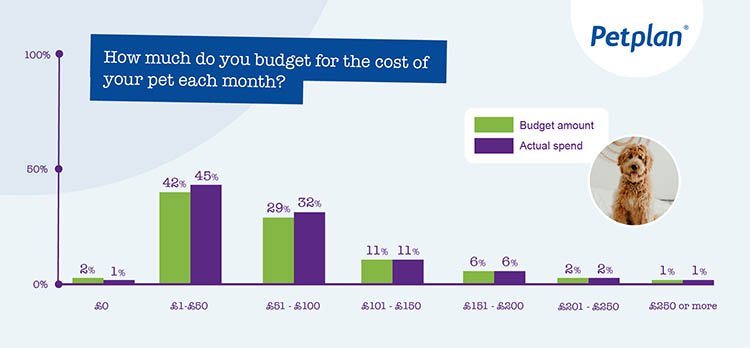
As the results show, UK pet owners are now cost-savvy, cautious cats who are generally budgeting well. The average Brit budgets £69 for pet expenses, and in reality, this is spot-on – £69 is the average monthly spend.
But the picture differed slightly depending on the pet:
Average monthly pet spend
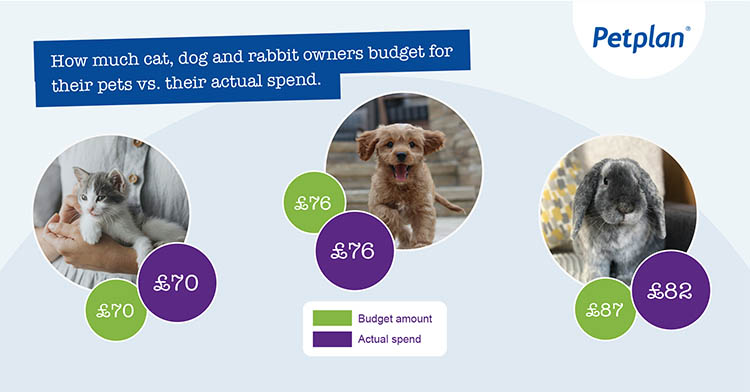
Based on 1,287 dog owners, 1,033 cat owners and 104 rabbit owners surveyed.
- 42% of cat owners budgeted £1-50 a month, but in reality, 45% spent in this bracket.
- 32% of dog owners planned to spend £51-100, but in the end, 35% did so.
- On the other hand, 6% of rabbit owners budgeted £251 or more a month, but their wallets could breathe a sigh of relief, as just 3% ended up spending this amount.
Regionally, we found that Greater London has the highest average spend on pets – £91 a month, compared to £69 on average. Yorkshire and the Humber recorded the lowest monthly pet spend – £59.
Interestingly, the survey showed that younger people generally spend more on their pets than older adults.
Average monthly pet spend by age
- Gen Z (aged 18-24 in our study) – £87
- Millennials (aged 25-34) – £84
- Older millennials (aged 35-44) – £75
- Gen X (aged 45-54) – £63
- Boomers (aged 55+) – £48
In these belt-tightening times, it would be easy for young, inexperienced pet owners to become overwhelmed. But our survey suggests that millions of first-time pet parents are taking their financial responsibilities seriously.
Preparation makes purr-fect
We all know that dogs, cats and rabbits are for life, not just for Christmas. But even the most passionate pet owners can be surprised when it comes to the realities of pet ownership.
Our survey found that 58% of pet owners researched how to train their pets before taking the plunge.
And once again, there were differences in response by age group: 76% of Gen Z (18–24-year-olds) said they’d researched pet training, compared to 36% of Boomers (aged 55+). While many older pet owners are confident they can rely on their experience, it’s encouraging to see that so many younger people are keen to learn the ropes.
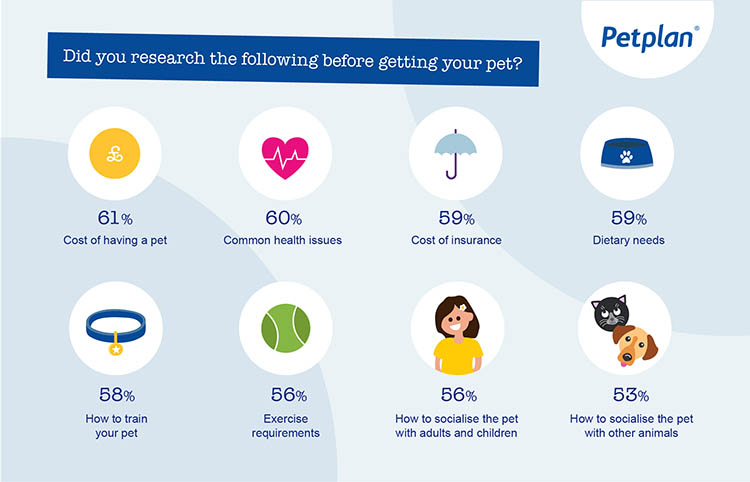
We found that rabbit owners are the likeliest pet parents (74%) to get advice on training. Indeed, in these flopsy-turvy times, rabbit owners are the most likely group to reach out to animal welfare charities for feeding advice, according to the 2023 PDSA Animal Wellbeing (PAW) Report.
There were differences across the UK. For instance, our survey revealed that pet owners in Greater London were the most likely (73%) to seek advice on pet training, while people in Wales were the least likely (45%).
Pets and our personal lives
While money, training and health issues are key aspects of pet parenthood, it’s always important to think about the impact our treasured animals have on our family lives.
A majority of respondents (60%) said they discussed their decision to get a pet, or any caring responsibilities, with family members or housemates. Those getting a rabbit (71%) were the likeliest pet owners to have these conversations, while Gen Z were the keenest of any age group (78%).
But was pet parenthood a shock to the system? Of those who expressed an opinion, here’s what they told us.
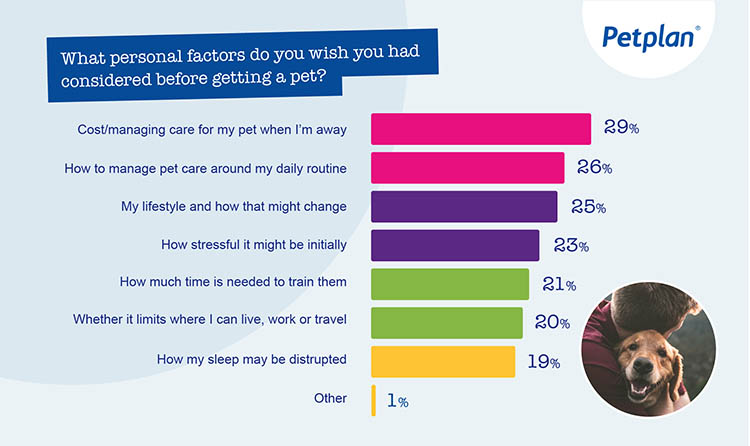
We all have different lifestyles, whether we spend our days working from home, raising children or sailing round the Arctic. So of course, it’s important to think about how pet ownership fits into our personal routines.
For those with the travel bug, finding a pet-sitter is part of the juggle. Gen Z were the most likely (41%) of any age group to say they wish they’d considered how to manage the costs and care of their pet while they’re away from home.
Meanwhile rabbit owners were the most likely (33%) to say they wish they’d considered how stressful it would be, including dealing with behavioural issues. They were also the likeliest (26%) to say they wish they’d thought about the implications for where they live, work or travel.
Is Britain pet-ready?
For all the ‘pet hates’ we admit to, our survey painted a portrait of a pet-loving nation that’s ready to live up to its responsibilities.
In total, 86% of people said they were prepared for pet ownership. This rose to 87% of women compared to 85% of men.
It appears that rabbit owners like to brush up on their homework, as 91% said they were prepared for becoming a pet parent. And for the majority of dog owners, there’s no turning bark – 87% agreed they were prepared for life with their pooch.
But which city is the most pet-ready in the UK? We asked pet owners across the country whether, in retrospect, they were ready for pet parenthood.
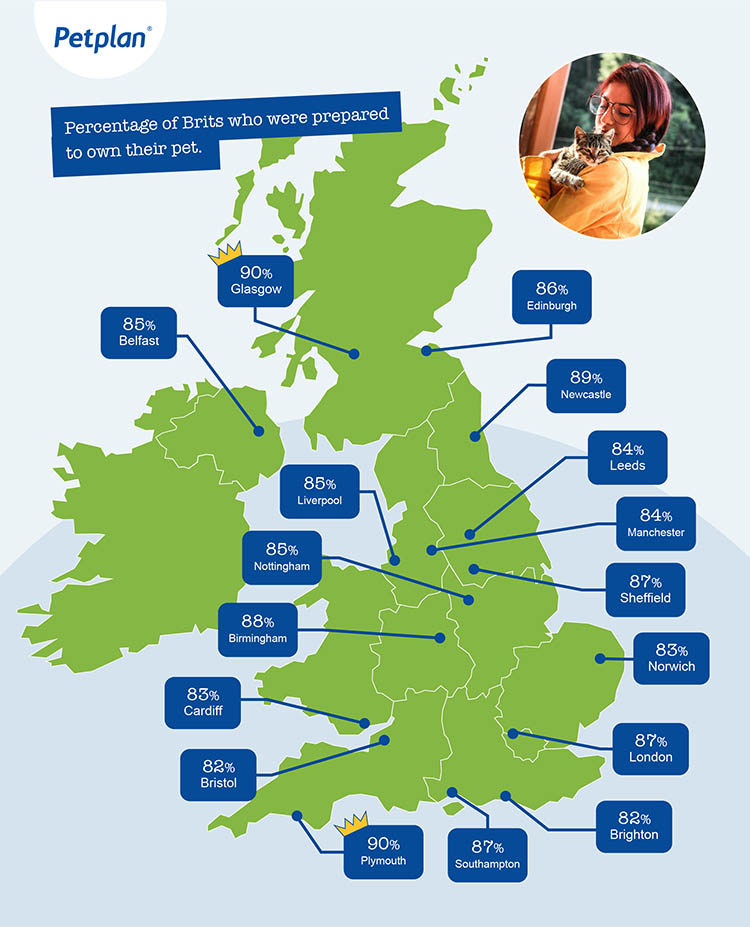
Glasgow and Plymouth shared the crown as the most pet-prepared city in the UK. On average, Glaswegians budget £58 a month in pet expenses (and spend £59), while people in Plymouth budget £67 and spend the same amount.
Get the ultimate pet ownership guide
There’s a first time for everything, and while Brits are largely confident about looking after their furry friends, there are plenty of challenges too.
Petplan’s vet expert, Brian Faulkner, FRCVS, says “preparing for pet parenthood is as essential as it is exciting. It is encouraging to see that British pet parents are taking the necessary steps to ensure they’re ready for the joys and responsibilities of pet ownership.
“From considering budgets to researching pet training, it’s evident that pet parents are committed to providing the best care for their furry companions.
“Amidst this wave of pet preparedness, it's important to also ensure the wellbeing of our beloved companions through comprehensive pet insurance. Petplan, a trusted provider in this realm, understands these needs.”
It’s important to understand your pet’s breeds and needs, so download our book of ‘firsts’ for puppy and kitten owners. It’s a handy keepsake to help you become the most pawsome (and clawsome) pet parent you can be.
And remember, even if your budgeting is bang-on, having no pet insurance in place can cost you more in the long run.
Know anyone who’s thinking of getting a pet? Share this article and spread the word!
Download PDFMethodology
We surveyed 2,017 UK pet owners, aged 18+ to understand their attitudes towards pet preparedness.